Research Fridays @ Intersections of Gender Archive
Past Sessions
On this page:
- Feeling fat: Embodying excess through the fat feminist grotesque
- Misogyny and Abuse in the Academic Library Workplace
- Indian Residential Schooling Histories During an Era of Truth and Reconciliation
- Keeyoukaywin as an Intersectionality Praxis: Métis ways of knowing, positioning, and learning with kin
- Junko Tabei, Pan Duo and Intersectional Approaches to Mountaineering
- Visual Pedagogies: Teaching Can Be a Real Drag (Show)
- Is the Inertia in Women's Heart Health Outcomes a Question of Intersectional Stereotyping?
- The global Black Lives Matter movement: a comparative look at postcolonial forms of BLM protest and activism in Germany and France
- Drag Race Pedagogy about Communities of Care in Teaching and Learning Spaces
- The Impacts of the Grassroots Movement: The Truth of the Survival of Indigenous Peoples
October 22, 2021 - Feeling fat: Embodying excess through the fat feminist grotesque
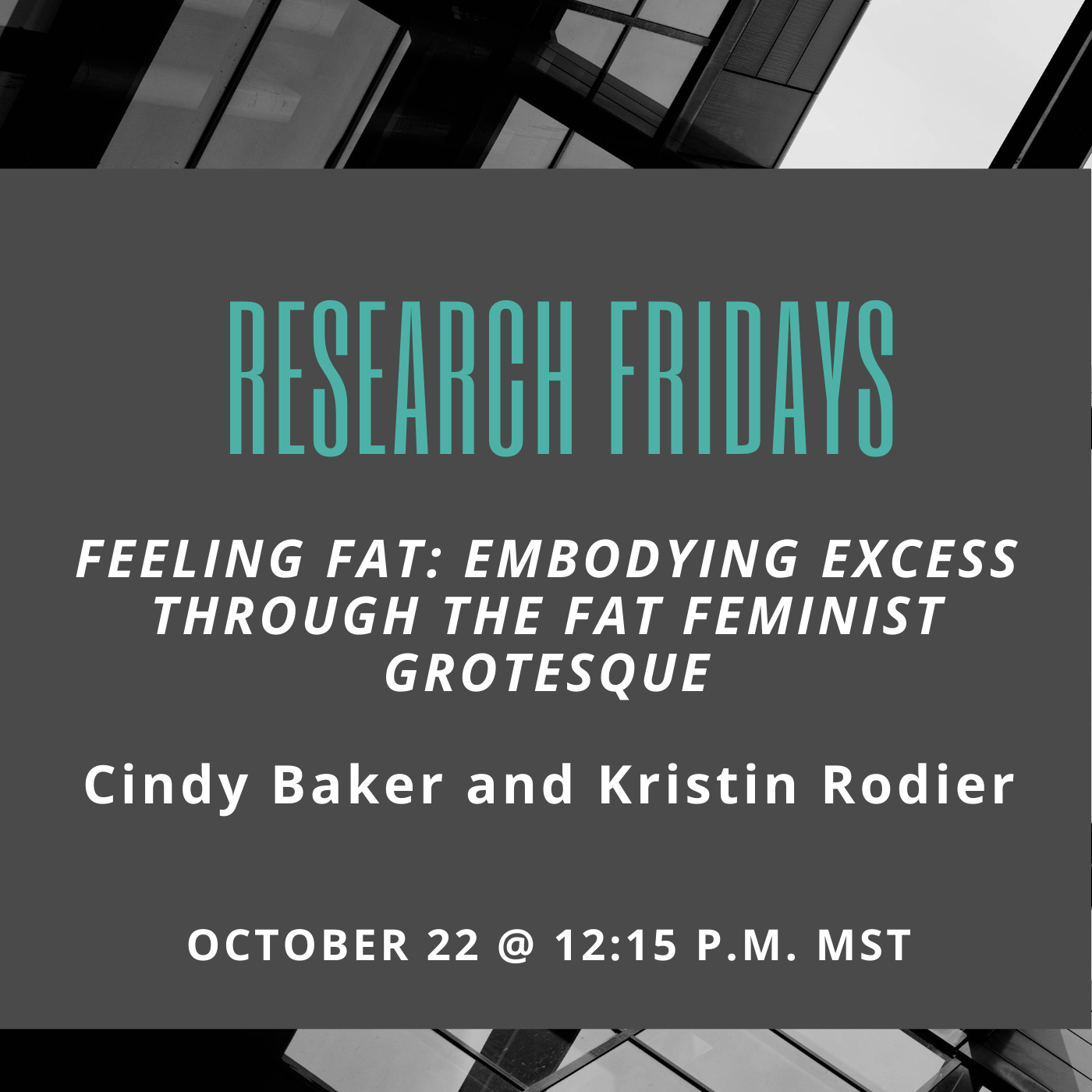
Fat studies and feminist scholars have a shared interest in understanding nuances of oppressive shame targeted at feminine bodies. This shame is often wrestled with in feminist art practices that engage in the grotesque, specifically the grotesque fat body. In order to sidestep questions of authentic fat experience, this paper develops a theory of fat feminist art practices that celebrate and revel in the grotesque. In doing so, we develop a critical fat phenomenology that transforms descriptions of fearing fat and feeling fat.
Cindy Baker is a contemporary artist based in Western Canada whose work is based in queer, gender, disability, fat, and art discourses. Committed to ethical community engagement and critical social enquiry, Baker's interdisciplinary research-based practice draws upon 25 years working and organizing in her diverse communities, moving fluidly between the arts, humanities, and social sciences, emphasizing the theoretical and conceptual over material concerns.. Baker has exhibited and performed across Canada and internationally, and continues to maintain a lifelong commitment to the strength and vitality of her communities.
Kristin Rodier holds a PhD in feminist philosophy from the University of Alberta (Treaty 6, Metis region 4) and is an Assistant Professor of Philosophy at Athabasca University (Treaty 6, Metis region 5). Her current writing employs a critical phenomenology of the body that intersects fatness, gender, ability, and race.
Watch Video Listen to Audio View Presentation Slides Read Transcript
November 5, 2021 - Misogyny and Abuse in the Academic Library Workplace
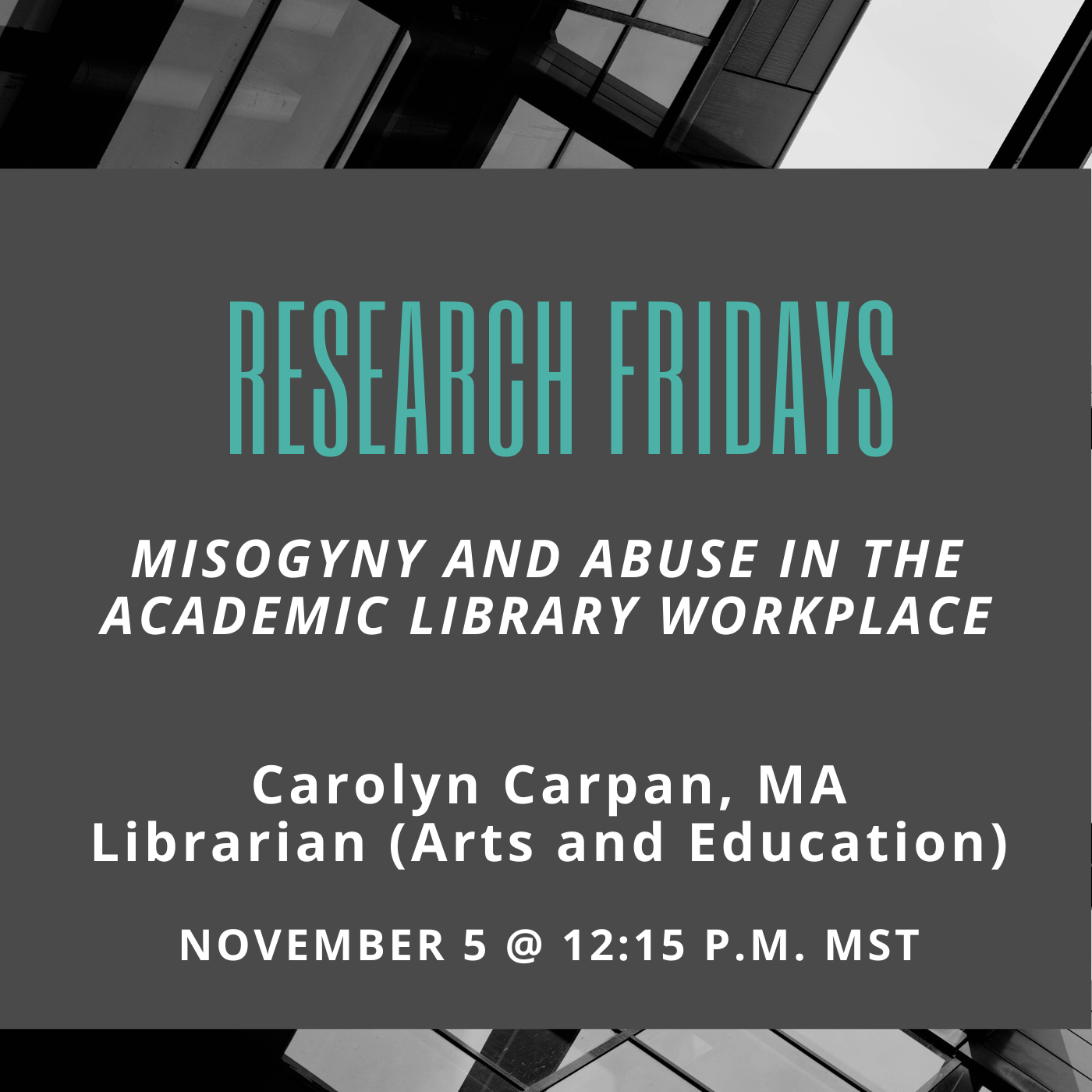
In an autoethnographic presentation, I reflect on the relationship between misogyny and abuse I have experienced in academic library workplaces during my twenty-year career as a practicing librarian, manager, and leader. Misogyny is defined as the hatred of women, which Kate Manne (2018) argues is manifested by individuals, collective activity, and structural mechanisms. Women and men are perpetrators of workplace misogyny and abuse, which is intended to silence, control, and disempower women.
In my experience, misogyny is present in library workplaces. It looks like bullying, mobbing, and threats of physical violence. Bullying includes verbal abuse intended to humiliate, intimidate, or threaten the bullying target and sabotage their work (Workplace Bullying Institute). Mobbing happens when multiple colleagues bully the same person, as happened to me in organizations where colleagues acted together to abuse me. Bullying and mobbing included physical threats of violence against me.
Carolyn Carpan has Masters degrees in Women's Studies and Library and Information Studies. She has worked as an academic librarian for more than 20 years in the United States and Canada. She is the author of several books and articles, including the best-selling reference book Rocked by Romance, about young adult romance fiction, and Sisters, Schoolgirls and Sleuths: Girls Series Books in America.
Watch Video Listen to Audio View Presentation Slides
December 3, 2021 - Indian Residential Schooling Histories During an Era of Truth and Reconciliation

Given the growing death toll of Indigenous children at Indian Residential Schools in what is now known as Canada, Crystal Gail Fraser (History/Native Studies) has visited the Provincial Archives of Alberta weekly to better understand the death toll of students at Alberta residential schools. This presentation will be sharing work in progress.
Crystal Gail Fraser (she/her) is Gwichyà Gwich'in and originally from Inuvik and Dachan Choo Gę̀hnjik, Northwest Territories. Her PhD research focused on the history of student experiences at Indian Residential Schools in the Inuvik Region between 1959 and 1996. Crystal's work makes a strong contribution to how scholars engage with Indigenous research methodologies and theoretical concepts, our understanding of Indigenous histories during the second half of the twentieth century, and how northern Canada was unique in relation to the rest of the settler nation. Her doctoral dissertation was awarded the 2020 John Bullen Prize by the Canadian Historical Association for her thesis, titled T’aih k’ìighe’ tth’aih zhit dìidìch’ùh or By Strength We Are Still Here. The prize honours the outstanding PhD thesis on a historical topic submitted in a Canadian university. Crystal is committed to service contributions through her work with the Faculty of Arts Committee for EDI, the Governing Circle of the National Centre for Truth and Reconciliation, and Gwich'in Council International Board. With her partner and young daughter, Crystal has lived on Treaty 6/Homeland of the Métis Nation since 2004.
Watch Video Listen to Audio View Presentation Slides
December 10, 2021 - Keeyoukaywin as an Intersectionality Praxis: Métis ways of knowing, positioning, and learning with kin
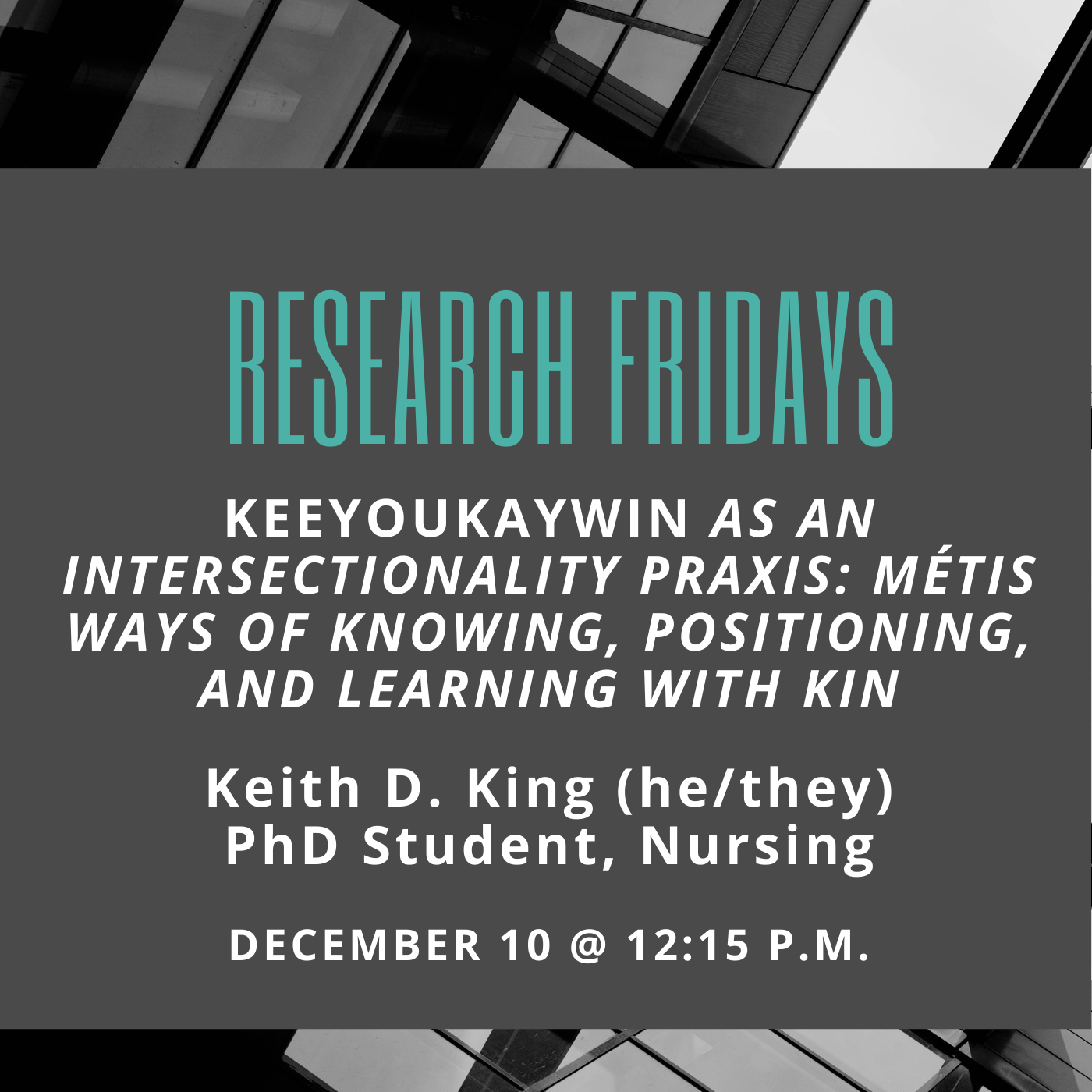
Keith D. King (he/they) will present the Métis methodology of keeyoukaywin (visiting) as a form of intersectionality informed praxis. This event will be a virtual kitchen table talk, with a short presentation on keeyoukaywin, and how it informs their research in Métis health, followed by practical application of the practice with the group using breakout rooms where we might explore how intersectionality is central to Indigenous knowledge generation.
Keith D. King (PhD Student, Nursing) is a two-spirit registered nurse and healer, and comes from a long family tradition of being nurses and healers on both sides of his family tree. He grew up on a farm in northern Alberta, in Treaty 8 territory and part of the Métis Homeland. Keith has found that his career in nursing has allowed his natural gifts for helping others, learning with others, and making connections that improve people’s lives to contribute to his community. In his career and life, Keith's greatest accomplishments and the things he is most proud of are the relationships he has built and maintained over time and distance with family, friends, colleagues, and other kin. Having worked in various specialties in nursing, Keith's main areas of expertise are in Mental Health and Substance Use, Sexual Health, and Nursing Leadership. Keith has a Masters of Public Health, and his masters thesis looked at the intersections of mental health and HIV in East London, in the UK. He is currently completing his PhD in Nursing, exploring Métis people’s experiences of HPV-related cancer prevention in Alberta through a Métis Intersectional lens.
* Because Keith's presentation was praxis-oriented, it was not recorded. We offer instead his presentation slides and a paper by Cindy Gaudet - The Visiting Way - about keeyoukaywin that Keith references for their work.
View Presentation Slides The Visiting Way by Cindy Gaudet
January 13, 2022 - Junko Tabei, Pan Duo and Intersectional Approaches to Mountaineering

This talk is based on content in Julie Rak’s recent book, False Summit: Gender in Mountaineering Nonfiction, and is about what it was like to research and write about Junko Tabei, the first female climber to summit Mount Everest, and Pan Duo, the second female climber to summit. Junko Tabei is known internationally (and has endured a lot of sexism and racism), and Pan Duo until Tabei's own intervention was not. Intersectional feminist approaches are vital for climbers and researchers as we piece together the story of female BIPoC climbers and their experiences.
Julie Rak (she/her) is Henry Marshall Tory Chair in the Department of English and Film Studies at the University of Alberta. Her latest book is False Summit: Gender in Mountaineering Nonfiction (MQUP 2021). She has written extensively on nonfiction, including the books Boom! Manufacturing Memoir for the Popular Market (2013) and Negotiated Memory: Doukhobor Autobiographical Discourse (2004). Her latest edited collection is the Identities volume of the Oxford Encyclopedia of Literary Theory (2020). With Sonia Boon, Candida Rifkind, Laurie McNeill and other clever colleagues, she is writing The Routledge Introduction to Auto/biography in Canada.
Watch Video Listen to Audio View Presentation Slides
January 28, 2022 - Visual Pedagogies: Teaching Can Be a Real Drag (Show)

Tommy Mayberry (Executive Director, Centre for Teaching and Learning) joins us for a talk that explores visual pedagogies through a sincere and earnest look at their life, one congruent of academic and drag cultures, of traditional teaching and dragged-up pedagogies. They bring together a constellation of transgender visuality, queer phenomenology, and visual performance as a social justice leader with an anti-imperialist inclusive practice.
Tommy Mayberry (he/she/they) is a scholar, professional, and academic drag queen with a background in diverse teaching and instructional facilitation in academia as well as industry. As a sought-after speaker on the topics of “Gender Pronouns and Cultures of Respect'' as well as visual pedagogies and LGBTQIA+ inclusivity, Tommy has presented their scholarship and research findings nationally as well as internationally, in places such as Oxford, Washington D.C., Tokyo, and Honolulu. They strive to embody and model decolonial, anti-racist, and equity-driven intersectional visions and leadership.
Watch Video Listen to Audio View Presentation Slides
February 4, 2022 - Is the Inertia in Women's Heart Health Outcomes a Question of Intersectional Stereotyping?
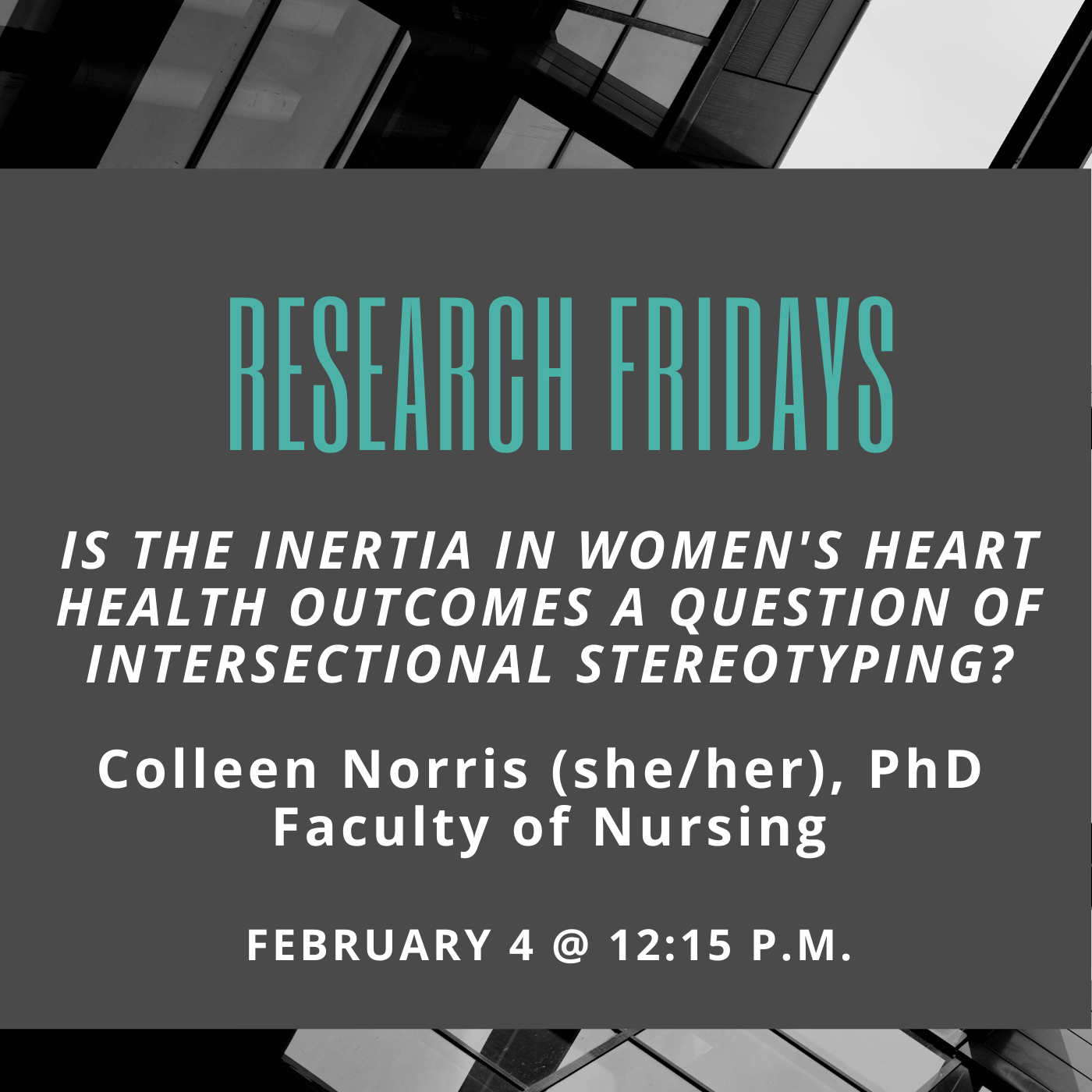
Heart disease in women is on the rise and is the leading cause of death for women worldwide. While the past decade has seen a proliferation of research identifying that the causes of heart disease can be “different for women,” heart attack symptoms are NOT RECOGNIZED in over 50% of women. Furthermore, the causes of heart disease can also be different for women. At present, 300 women a year in Alberta present at an Emergency department, are discharged home and go on to suffer from a heart attack within 30 days of the ER presentation. Our research in sex and gender science suggest that intersectional stereotyping may mean that health care workers use one lens in caring for a person's “heart,” which is presently male centric, and overlook sex and gender attributes that make a person's presentation of heart events unique.
Dr. Colleen Norris is a Professor and Clinician Scientist with University of Alberta’s Faculties of Nursing, Medicine, and School of Public Health. Her PhD is in clinical epidemiology. Dr. Norris, a nurse by training, completed post-doctoral training with the Canadian Cardiovascular Outcomes Research Team (CCORT) and Tomorrows Outcome Researchers in Cardiovascular Health (TORCH) in health outcomes research and developed the Alberta Provincial Project for Outcome Assessment in Coronary Heart Disease (APPROACH) follow-up program. Dr. Norris is the Scientific Director of the Cardiovascular Health and Stroke Strategic Clinical Network for Alberta Health Services. Her program of research focuses on the sex and gender factors that impact women’s heart health. She is the past Chair of the Canadian Women’s Heart Health Alliance (CWHHA) Health Policy and Services (HP&S) working group, whose mandate is to implement policies that advance our understanding of the unique sex and gender factors affecting the outcomes of women’s heart health. She is a committee member on the Women’s Heart and Brain Health Network Research Steering Committee, and is actively involved in advancing sex and gender-based analysis and reporting in Heart & Stroke funded research. In 2018, Dr. Norris was designated as the sex and gender champion on the CCS clinical guidelines committee where she established and published a methodology that is used to incorporate sex and gender specific information into CCS clinical practice guidelines. Dr. Norris is a Fellow of the American Heart Association and the CO-PI in a CIHR/GENDER-NET Plus research project- GOING-FWD, an international collaborative of researchers from five countries, evaluating the impact of sex and gender factors on outcomes. Dr. Norris has mentored over 80 students/trainees. She has presented extensively and has over 300 publications in the areas of sex and gender differences in cardiovascular treatment and outcomes, and women’s heart health.
Watch Video Listen to Audio View Presentation Slides
Dr. Norris highlighted a set of Know Your Symptoms heart health cards in her presentation which we also provide here.
March 25, 2022 - The global Black Lives Matter movement: a comparative look at postcolonial forms of BLM protest and activism in Germany and France

IG welcomes Distinguished Visitor, Julien Bobineau (University of Würzburg) to Research Fridays @ Intersections of Gender!
The lecture offers a critical and postcolonial overview of police violence, racism and the Black Lives Matters movement in France and Germany. Besides striking differences, there are also some interesting parallels between the movements in the neighbouring countries, which will be examined within the lecture from a cultural studies perspective.
Julien Bobineau studied French Philology, Public & International Law and Philosophy at the University of Würzburg (Germany) and the University of Kinshasa (DR Congo). In 2012, he graduated in Francophone Literature with a comparative work on the Afro-Caribbean documentary theatre and the Japanese dance theatre. In 2017, Bobineau finished his PhD thesis where colonial discourses from Belgium and the Democratic Republic of the Congo are comparatively analyzed and brought into relation with the representation of Patrice Lumumba (1925-1961) in francophone drama and poetry. Bobineau currently works as Assistant Professor at the Institute for Modern Languages at the University of Würzburg. His research interests include the history, literature, politics and arts in the Democratic Republic of Congo as well as colonial memory, racism and anti-colonial movements in Europa while his habilitation explores hunting ethics and aesthetics in the field of French and Spanish literature during the 18th and 19th centuries.
Watch Video Listen to Audio View Presentation Slides
April 22, 2022 - Drag Race Pedagogy about Communities of Care in Teaching and Learning Spaces
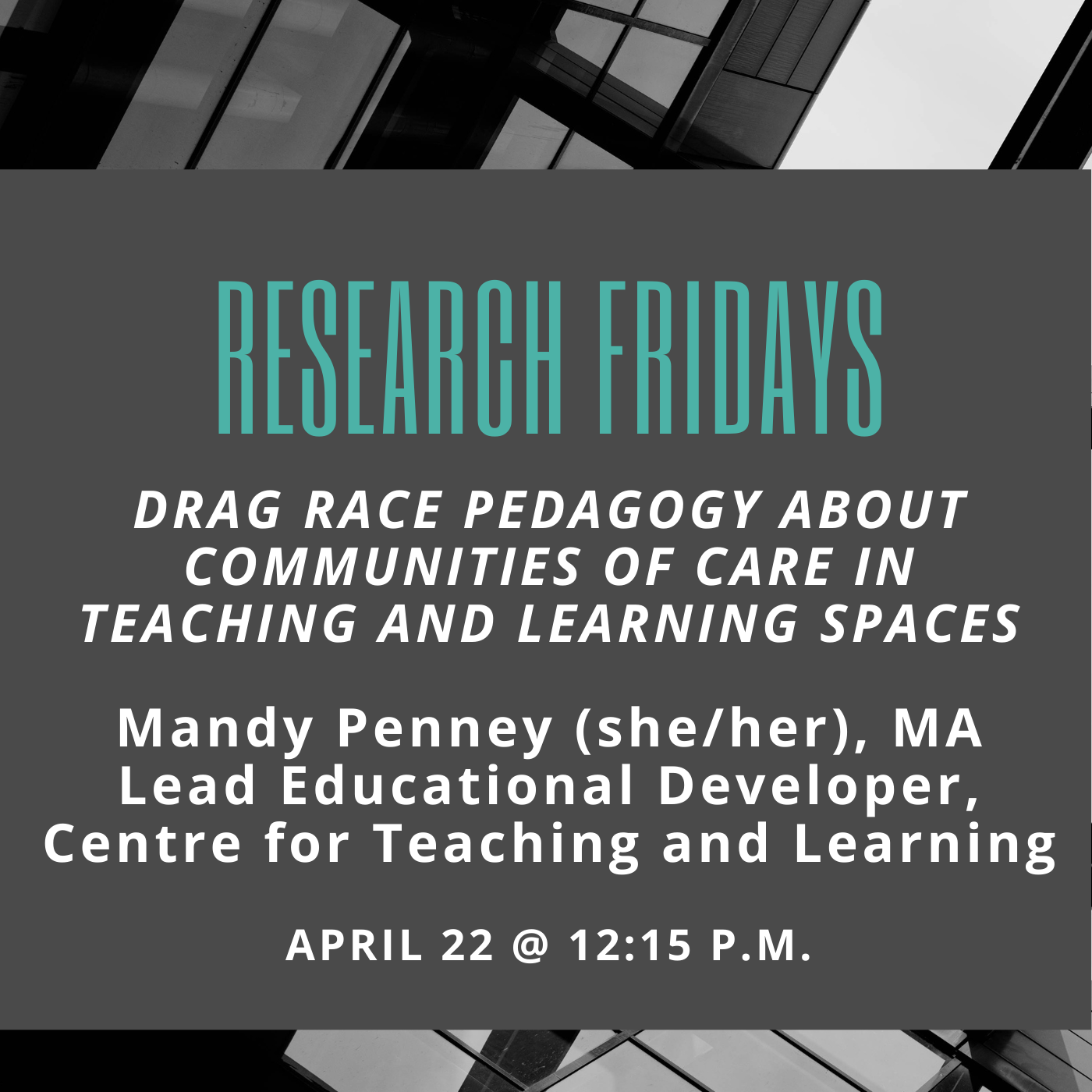
IG welcomes Mandy Penney, Lead Educational Developer in Digital Pedagogies and Writing Across the Curriculum at the Centre for Teaching and Learning!
In this session, Mandy will summarize her recently-published chapter in RuPedagogies, focusing on what the first pandemic season of RuPaul teaches us - in ways both productive and concerning - about ethical and sustainable teaching/learning in community. Attendees will be invited to participate in collaborative brainstorming on strategies for developing communities of practice and care at this challenging and complex global moment.
Mandy (she/her) is a white, cis, queer settler originally from Newfoundland. She is the Lead Educational Developer in Digital Pedagogies and Writing Across the Curriculum at the Centre for Teaching and Learning at UAlberta. She is passionate about digital pedagogies, writing instruction, accessibility, and communities of practice/care. She has worked in various academic roles, most recently as a writing & learning centre coordinator. Mandy advocates for equitable, values-driven, and relationship-based practices in teaching and learning. She is an active member of the Canadian Writing Centres Association and the International Writing Centres Association. Ultimately, Mandy is committed to (re)imagining teaching and learning possibilities at this important and challenging global moment.
Watch Video Listen to Audio Presentation Slides
September 16, 2022 - The Impacts of the Grassroots Movement: The Truth of the Survival of Indigenous Peoples
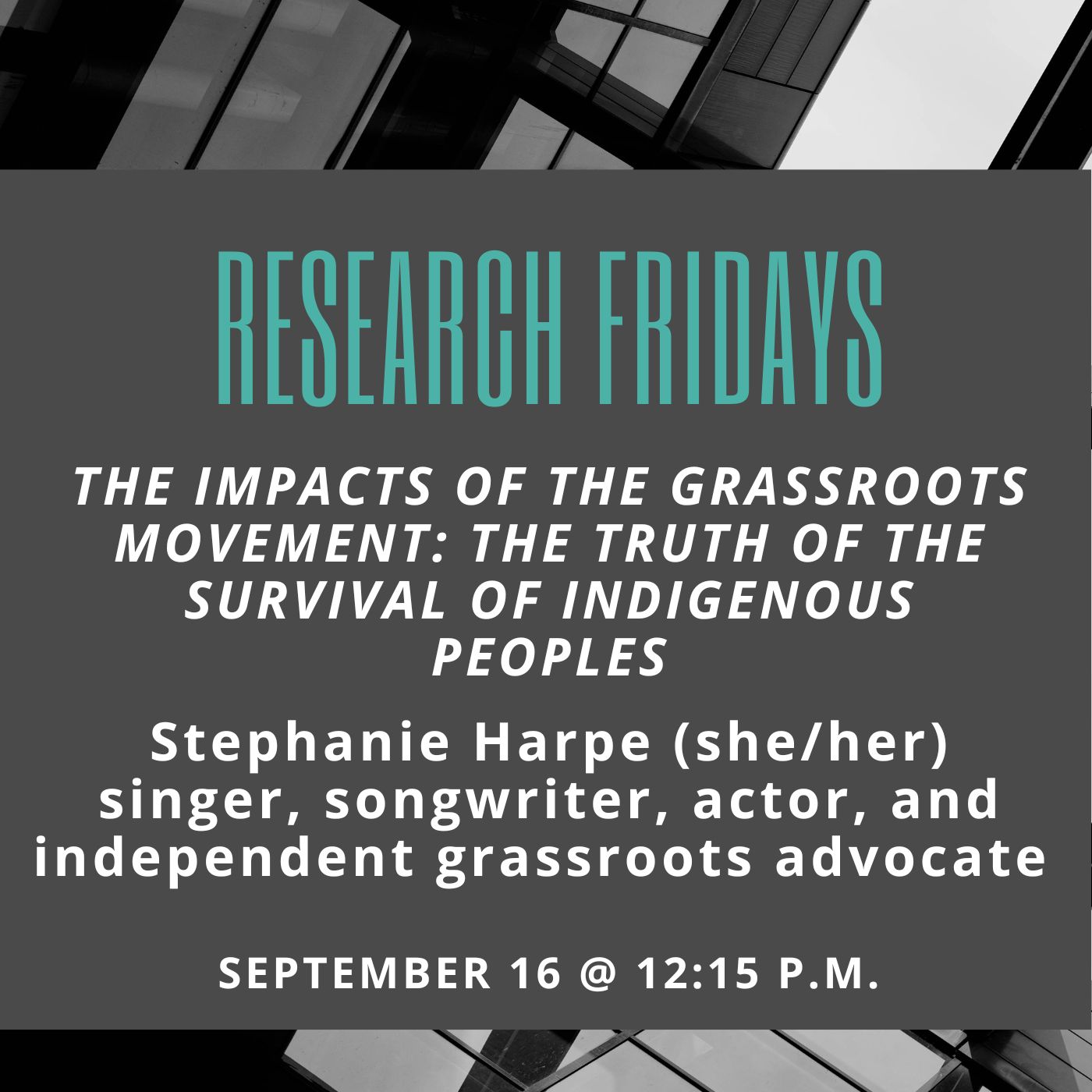
IG welcomes Stephanie Harpe (she/her), a singer, songwriter, actor, and independent grassroots advocate for Indigenous peoples. Stephanie will forefront the struggle of Murdered or Missing and Exploited Indigenous Peoples (MMEIP) and share how she is healing, fighting, and loving in times of genocide, systematic racism, and oppression. With a special focus on provincial and national action plans, particularly the MMEIP Initiative for Fort McMurray, Stephanie will speak to the growing problem of human trafficking in Canada, the importance of grassroots activism, hearing voices on the ground, and the need to lead in love.
Hosted by Lana Whiskeyjack, multidisciplinary treaty nêhiyaw (Cree) scholartist from Saddle Lake Cree Nation and Assistant Professor in the Faculty of Arts, Women's and Gender Studies.
Stephanie Harpe is an international advocate for the safety, security, and human rights of Murdered or Missing and Exploited Indigenous Peoples (MMEIP). She is a Residential School and murder attempt survivor, daughter of a murdered mother, niece of a historical Chief, and a member of the community of Fort Mckay First Nations.
Lana Whiskeyjack is a multidisciplinary treaty nêhiyaw (Cree) scholartist from Saddle Lake Cree Nation and assistant professor in the Faculty of Arts, Women's and Gender Studies, at the University of Alberta. Lana integrates Indigenous ways of knowing within Western academia in her scholarship, research and course development. Her research, writing, and creativity focuses on Indigenous sexual health, economic security, transforming intergenerational trauma to resilience, and Indigenous visual literacy.